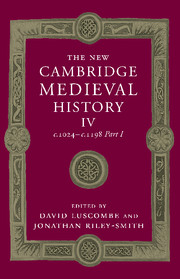Book contents
- Frontmatter
- 1 Introduction
- 2 The Rural Economy and Demographic Growth
- 3 Towns and the Growth of Trade
- 4 Government and Community
- 5 The Development of Law
- 6 Knightly Society
- 7 War, Peace and the Christian Order
- 8 The Structure of the Church, 1024–1073
- 9 Reform and the Church, 1073–1122
- 10 Religious Communities, 1024–1215
- 11 The Institutions of the Church, 1073–1216
- 12 Thought and Learning
- 13 Religion and the Laity
- 14 The Crusades, 1095–1198
- 15 The Eastern Churches
- 16 Muslim Spain and Portugal: Al-Andalus and its Neighbours
- 17 The Jews in Europe and the Mediterranean Basin
- 18 Latin and Vernacular Literature
- 19 Architecture and the Visual Arts
- List of Primary Sources
- Bibliography of secondary works arranged by chapter
- Index
- Frontispiece">
- Plate section"
- References
5 - The Development of Law
Published online by Cambridge University Press: 28 March 2008
- Frontmatter
- 1 Introduction
- 2 The Rural Economy and Demographic Growth
- 3 Towns and the Growth of Trade
- 4 Government and Community
- 5 The Development of Law
- 6 Knightly Society
- 7 War, Peace and the Christian Order
- 8 The Structure of the Church, 1024–1073
- 9 Reform and the Church, 1073–1122
- 10 Religious Communities, 1024–1215
- 11 The Institutions of the Church, 1073–1216
- 12 Thought and Learning
- 13 Religion and the Laity
- 14 The Crusades, 1095–1198
- 15 The Eastern Churches
- 16 Muslim Spain and Portugal: Al-Andalus and its Neighbours
- 17 The Jews in Europe and the Mediterranean Basin
- 18 Latin and Vernacular Literature
- 19 Architecture and the Visual Arts
- List of Primary Sources
- Bibliography of secondary works arranged by chapter
- Index
- Frontispiece">
- Plate section"
- References
Summary
the intellectual and economic background to the new direction in the development of law in the eleventh century
in comparison with what preceded and followed it, the eleventh century can be seen as a time of rupture and crisis in European history. An influential recent study of European legal history by the American scholar Harold Berman sees the foundations of the ‘western legal tradition’ in a papally inspired ‘revolution’ between 1075 and 1122, namely the transformation of legal systems inspired by Pope Gregory VII (1073–85). This development has traditionally been known as the ‘Gregorian reform’, but the term does not do justice to its revolutionary character. Although Berman’s interpretation of eleventh-century legal history may be somewhat overstated, it is scarcely possible to deny that a new direction, ‘un tournant dans l’histoire du droit’, was taken in the closing decades of the eleventh century, marking a clear historical transition in the development of law. This new direction can be linked thematically to the great ideological struggle between pope and emperor, the Investiture Contest. Formally, it could be seen as a definitive espousal of written forms of law and a renunciation of previous approaches which depended extensively on the continual adaptation of oral traditions. That earlier legal culture is hard to relate to concepts based on modern forms of law.
In order to account for the eleventh-century transformation, we must first glance back at the laws and legal systems of the early middle ages, although by our period these had already begun to give way to new forms of law. It is not at all easy to distil from the sources, which are mostly not legal documents as such, the exact nature of legal systems between the collapse of the Carolingian empire and c. 1050.
Keywords
- Type
- Chapter
- Information
- The New Cambridge Medieval History , pp. 113 - 147Publisher: Cambridge University PressPrint publication year: 2004
References
- 4
- Cited by

